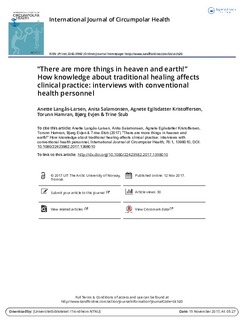“There are more things in heaven and earth!” How knowledge about traditional healing affects clinical practice: interviews with conventional health personnel
Journal article

Åpne
Permanent lenke
http://hdl.handle.net/11250/2466482Utgivelsesdato
2017Metadata
Vis full innførselSamlinger
Originalversjon
Langås-Larsen, A., Salamonsen, A., Kristoffersen, A.E., Hamran, T., Evjen, B. & Stub, T. (2017). “There are more things in heaven and earth!” How knowledge about traditional healing affects clinical practice: interviews with conventional health personnel. International Journal of Circumpolar Health, 76(1), 1398010. http://dx.doi.org/10.1080/22423982.2017.1398010Sammendrag
People with Sami and Norwegian background are frequent users of traditional folk medicine (TM). Traditional healing, such as religious prayers of healing (reading) and the laying on of hands, are examples of commonly used modalities. The global aim of this study is to examine whether health personnel’s knowledge, attitudes and experiences of traditional healing affect their clinical practice. Semi-structured individual interviews (n=32) and focus group interviews (n=2) were conducted among health personnel in two communities in Northern Norway. The text data was transcribed verbatim and analysed based on the criteria for content analysis. Six themes were identified. The participants had acquired their knowledge of traditional healing through their childhood, adolescence and experience as health personnel in the communities. They all expressed that they were positive to the patients’ use of traditional healing. They justified their attitudes, stating that “there are more things in heaven and earth” and they had faith in the placebo effects of traditional healing. The health personnel respected their patients’ faith and many facilitated the use of traditional healing. In some cases, they also applied traditional healing tools if the patients asked them to do so. The health personnel were positive and open-minded towards traditional healing. They considered reading as a tool that could help the patients to handle illness in a good way. Health personnel were willing to perform traditional healing and include traditional tools in their professional toolkit, even though these tools were not documented as evidence-based treatment. In this way they could offer their patients integrated health services which were tailored to the patients’ treatment philosophy.
